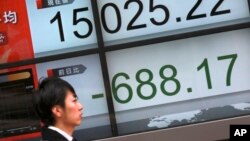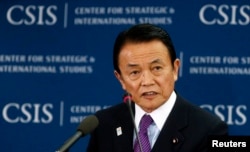Speculation rose Friday that the Bank of Japan would call an emergency meeting prior to its next scheduled session in mid-March amid a surging yen and plunging equity prices.
Observers are saying the central bankers might push interest rates even further below zero and expand an asset purchase program that already totals about $710 billion (80 trillion yen) annually.
Japan’s benchmark stock index, the Nikkei 225, fell to a 16-month low Friday, down 760 points; a drop of more than 4.8 percent for the day. The index has shed nearly 2,000 points since early Tuesday – an 11 percent drop.
The broader TOPIX index fell more than 5.4 percent Friday amid continuing gloom about the global economic situation and a rising Japanese currency, which hurts the country’s exporters.
The U.S. dollar dipped to the 110-yen level before recovering slightly, giving the Japan currency a gain in value against the greenback of nearly 10 percent since the Japanese central bank took interest rates below zero at the end of last month – a bold move that stunned investors.
Shares in Japanese financial institutions led Friday’s losses. Financial shares also led declines Friday in Australia and Hong Kong.
Market analysts in Tokyo interpreted the trading turbulence as a reflection of concerns about a global slowdown and the possibility of recession in the world’s largest economy, the United States. That has investors shedding equities and fleeing to the safe havens of government bonds, gold and the Japanese currency.
Finance Minister Taro Aso warned that Japan would not hesitate to “to act appropriately” to slow a surging yen, saying his ministry was watching the currency market with “a sense of tension.”
The yen is expected to be on the agenda when G20 finance leaders meet later this month in Shanghai.
“We have to look at ways we can promote policy coordination heading into the G20 meeting,” Deputy Vice Finance Minister Masatsugu Asakawa told reporters.
Prime Minister Shinzo Abe on Friday met during the trading day with central bank governor Haruhiko Kuroda, who denied that the Tokyo market’s nosedive this week is a result of the Bank of Japan’s (BOJ) negative interest rate policy, but rather “excessive risk aversion” among global investors.
Kuroda told reporters he did discuss with Abe the world economy and the market moves, but there was “no particular comment from the prime minister” on monetary policy.
The mere action of Kuroda going to the prime minister’s office slightly eased investors concerns, helping to take the Tokyo Stock Exchange off its low point for the day, according to Maki Sawada of Nomura Securities’ investment research department.
Sawada added her voice to the chorus of specialists in Tokyo that the BOJ would soon convene an emergency meeting amid “shaky confidence caused by a dim outlook for markets around the world the world.”
Meanwhile, the top government spokesman on Friday declared Japan’s economic fundamentals are sound.
Despite the huge drop for share prices here in recent days when “looking at the actual economy, company earnings are among the best ever seen and the Japanese economy is stable,” said Chief Cabinet Secretary Yoshihide Suga.
Japan’s economy, the world’s third largest, has been in a funk ever since its bubble burst in the early 1990s.
For the past three years, Abe has pushed fiscal stimulus, monetary easing and structural reforms – the three arrows of “Abenomics” - with little to show for the effort.
Critics have called for much bolder reforms, but opponents warn of the risk to social cohesion if Japan were to see mass layoffs and an influx of cheaper labor from abroad.









